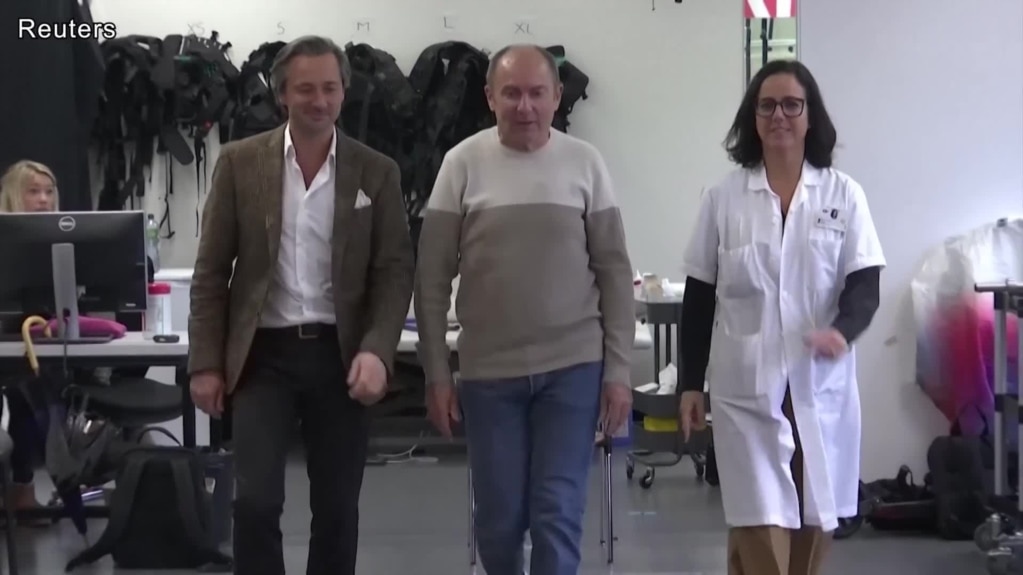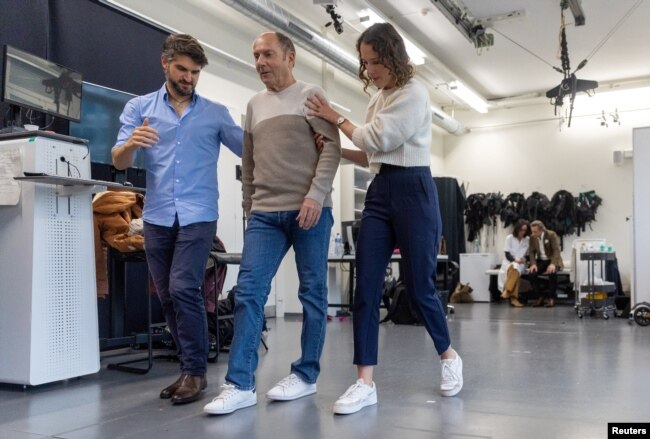AUDIO
Swiss-designed Technology Helps Parkinson's Patient Walk Again

Marc Gauthier has Parkinson’s disease.
The disease affects his nervous system, weakens his muscles and causes his arms and legs to shake.
The 63-year-old Gauthier had not been able to leave his home for some time. But that was until he became the first person to receive a new Swiss-designed medical device that greatly improved his ability to walk.
Gauthier received a medical device called a neuroprosthetic at Switzerland’s Lausanne University Hospital (CHUV). Part of the device, called an electrode field, is placed against part of the nervous system which runs in the back called the spinal cord. Another part of the device, found under his skin below the stomach, uses electricity to stimulate the spinal cord to start up his leg muscles. It is called an electrical impulse generator.
"It changed my life because I'm now independent," said Gauthier, a native of the French city of Bordeaux, as he sat with his doctors at CHUV. "I can leave my home, run errands. I even go on foot."

Marc Gauthier, 63, walks with the help of Eduardo Martin Moraud Head of Parkinson's Research at NeuroRestore and Camille Varescon, Clinical Research Engineer during a media presentation at the CHUV in Lausanne, Switzerland, November 2, 2023. (REUTERS/Denis Balibouse)
The number of people affected by Parkinson’s disease has doubled over the past 25 years, the World Health Organization found. Worldwide estimates showed that more than 8.5 million people suffered from the disease in 2019.
Grégoire Courtine is one of the doctors leading the project. He said the electrical pulses delivered to Gauthier’s spinal cord has permitted him to walk the way he would have without the disease.
"We strongly believe that many individuals could benefit from this therapy," said Courtine. He is a professor at the Swiss Federal Institute of Technology Lausanne (EPFL), the University of Lausanne and CHUV.
The study was published in Nature Medicine recently. The findings by Courtine’s team at the NeuroRestore research center suggest the technology could be used more widely in patients with more progressed Parkinson’s. Many of those with more progressed, or advanced, Parkinson’s have severe problems with being able to move.
Dave Marver is chief executive officer of Onward Medical, which designed the medical device. He said that the device was similar to another device called an implantable defibrillator and those used to deal with pain. But he added the device is special in the way that it targets the spinal cord.
"For the health care system, it will look and feel familiar, but it will offer therapy that doesn't exist today," he said.
Courtine’s team plans to carry out continuing researching and test the device on six new patients next year.
Jocelyne Bloch is the doctor who performed the operation on Gauthier and co-director of NeuroRestore. She said with this therapy, if people can gain belief in themselves and can go out, socialize and do more things, it is a big plus “… in their daily activities and quality of life.”
I’m Gregory Stachel.
Cecile Mantovani and Gabrielle Tétrault-Farber reported this story for Reuters. Gregory Stachel adapted the story for VOA Learning English.
______________________________________________________
Words in This Story
nervous system – n. the system of nerves in your body that sends messages for controlling movement and feeling between the brain and the other parts of the body
stimulate – v. to make (something) more active
errand – n. a short journey that you take to do or get something
pulses – n. a brief increase in an amount of electricity, light, or sound
therapy – n. the treatment of physical or mental illnesses
familiar – adj. frequently seen, heard, or experienced
https://learningenglish.voanews.com/a/swiss-designed-technology-helps-parkinson-s-patient-walk-again/7345630.html